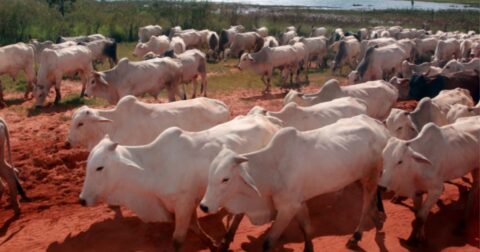Explainer
How Overconsumption Affects the Environment and Health, Explained
Climate•12 min read
Explainer
The world’s largest beef producer is accused of false advertising.


Words by Gabriella Sotelo
Just over three years ago, the world’s largest beef producer JBS launched its “Net Zero by 2040” campaign, pledging to curb the company’s climate emissions so significantly that JBS could claim a balance of zero emissions by the end of the next two decades. In the years that followed, journalists, researchers and even government officials documented the glaring discrepancies between the company’s commitments and its action. The New York State’s Attorney General, Letitia James, has now filed a lawsuit against the U.S. division of JBS, alleging the company’s marketing, like “net zero by 2040” and “bacon, chicken wings, and steak with net-zero emissions,” is false and deceptive advertising. This legal action is part of a growing trend of governments looking to close the gap between the climate pledges made by global conglomerates like JBS and corporate action . We broke down the claims of this lawsuit, and what it might mean for the future of “net zero” claims.
JBS Foods is the leading beef and poultry producer in the world, and the second largest pork producer. JBS has also made a modest foray into the alternative protein field, opening a cultivated beef factory in Spain, though in 2022 the company shuttered its plant-based facility, Planterra, in Denver.
In 2021 JBS has globally emitted more than 421.6 million metric tons of carbon dioxide equivalent. The global meatpacking giant has also driven more than 2.4 million acres of deforestation in the Amazon rainforest, said Glenn Hurowitz, CEO of Mighty Earth, an advocacy organization that works on protecting nature and restoring wildlife, in a press release from the Attorney General’s office.
“When companies falsely advertise their commitment to sustainability, they are misleading consumers and endangering our planet. JBS USA’s greenwashing exploits the pocketbooks of everyday Americans and the promise of a healthy planet for future generations,” said Attorney General James, in the same press release.
Filed in February of this year, the AG’s lawsuit is the culmination of a year-long investigation. The suit hinges on two main points. First, that JBS is aware that their consumers are concerned about the sustainability of the products they purchase. In a filing to the Securities and Exchange Commission in 2023, the JBS Group mentioned that consumer interest in plant-based products is driven by a growing perception of “environmental impacts of animal-based meat consumption,” which could have a negative impact on demand for meat. Second, JBS Group has made the “Net Zero by 2040” claim repeatedly. A hallmark of the meatpacking giant’s environmental plan, JBS has presented this claim as ‘fact’ to its consumers.
These actions are almost certainly not accidental. Companies like JBS understand that consumers care about the environment, suggests Melissa Aronczyk, PhD, a professor of media studies at Rutgers University who researches how corporations have used the public relations industry to control how the public sees climate change and other environmental crises.
It’s not uncommon for a company to launch a promotional campaign to counter their own poor environmental records, she wrote in an email to Sentient. “Too often, these plans are empty promises of future behaviors that are designed to absolve these companies of responsibility for climate damages or accountability to fix the problems they’ve helped to cause.”
In the suit, NY Attorney General James argues that JBS USA has violated general business laws by “engaging in deceptive acts or practices” when it claims in its marketing materials that the company will reach net zero by 2040. The lawsuit is based on false advertising protections rather than environmental laws.
“All companies have to comply with general standards of how they talk to consumers — how they market their goods — and those cannot be fraudulent or misleading,” Peter Lehner, director of Earthjustice’s Sustainable Food & Farming Program, tells Sentient.
“If a company is spending more money and effort to advertise its environmental commitments than on environmentally sound practices – that’s greenwashing,” wrote Aronczyk. “If the public and other audiences are being misled, deceived, or otherwise confused about an organization’s environmental strategies, goals, motivations, and actions – that’s greenwashing.”
This is not the first time that an agency has tried to hold JBS accountable for making these types of ‘false’ claims. In 2023, a non-profit with the Better Business Bureau, the National Advertising Division, recommended JBS stop advertising this claim of ‘net zero by 2040.’ Instead, JBS decided to appeal the recommendation. And since NAD is not a law enforcement body, JBS was under no legal obligation to change its marketing (and it did not do so).
JBS has made their net-zero claims in a number of different forums, from their advertisements to their own website, and according to the lawsuit, at one New York City Climate Week event.
In a number of media outlets, JBS has made these net zero claims in sponsored advertorials. The newsletter Heated rounded up several examples of these advertisements or sponsored content. One advertisement, included in the lawsuit, was published in The New York Times, and states “bacon, chicken wings, and steak with net-zero emissions. It’s possible.” The advertisement followed with “We are the first major global company in our industry to commit to net zero by 2040. Can it actually be done? We think so and we’re taking real actions to achieve our goal.” While other representations all included one thing, net zero by 2040.
It has been 3 years since JBS first set its net zero commitment, but to date the company’s only efforts to address emissions from cattle burps and land — the largest drivers of food-related emissions — are limited renewable energy and recycling initiatives rather than implementing measures to reduce the overall meat production, which is essential for significant emissions reduction in the long term.
Among the ‘net-zero’ strategies, JBS has pledged to use renewable electricity by 2040, and invest money into research and development projects. One project supports research into technologies to reduce enteric methane emissions and another trials carbon sequestration efforts on a 10,000-acre pilot in Indiana that supports the company’s pork production.
But as research has made clear, the most effective strategy for reducing food-related greenhouse gas emissions is scaling back meat production. A report from the Animal Law & Policy Program at Harvard Law found expert agreement that reducing meat consumption — and the number of farmed animals overall — is vital for achieving Paris Agreement global climate targets of keeping global warming to within 1.5 degrees Celsius of temperature change.
For JBS, achieving net-zero emissions would require a significant reduction in herd size and the number of animals slaughtered. Yet the company has made no such commitment. Quite the opposite, in fact, as this month JBS announced it would double the slaughtering capacity of one of its Brazilian beef plants.
Every year, more than 70 billion land animals are raised and slaughtered for food, contributing to 57 percent of food-related emissions. Greenhouse gas emissions can come from feed production, manure management and enteric fermentation, or what are more simply described as cow burps.
Advocacy groups have previously pursued legal and regulatory enforcement actions to prevent meat companies from making similar ‘climate friendly’ claims. Last year the Environmental Working Group petitioned the USDA to prohibit beef producer Tyson Foods, and in general, other meat companies, like JBS, from making climate friendly claims on their products.
In an email to Sentient, Aronczyk writes that these lawsuits are a way to begin making the link between public deception by corporations and climate pollution. Companies have long assumed that their advertising is “exempt” from any legal pursuits in comparison to an official filing, like annual reports. But in the age of the internet and social media, where engagement and impact can be monitored, companies may soon find it difficult to make empty climate claims.
“It is far easier to demonstrate the reach and impact of these promotional messages and activities and therefore claim that they have engaged in communication that has deceived the public,” writes Aronczyk. “So I think we are going to see companies being much more careful in what they say in ads and how they present their brand to avoid the tarnish of greenwashing.”
JBS had to answer the New York Attorney General’s complaint within 30 days of the summons delivery. In what is available to the public, JBS has not yet responded to the summons.
There is also the option of a motion to dismiss, which challenges the legal basis of the case even if the facts presented in the complaint are accepted as true, or they might even ask for an extension of time to respond.
The New York lawsuit signals to other companies to be wary of the claims that they make in their advertising, environmental or not.
“For decades, the fossil fuel industry tried to get ordinary people to take responsibility for the climate crisis. We were told to recycle our plastic bottles and drive smaller cars,” Aroncyzk writes. “Finally we are starting to realize that those messages were really about the fossil fuel industry trying to sidestep their own responsibility for causing global warming.”
For food-related emissions, there’s no getting around the fact that getting consumers in the global north to eat a little less meat is crucial to curbing climate pollution from food. Yet this lawsuit is one way governments are looking to hold the meat industry responsible for its role in driving emissions. If successful, it may pave the way for more legal action aimed at thwarting misinformation.